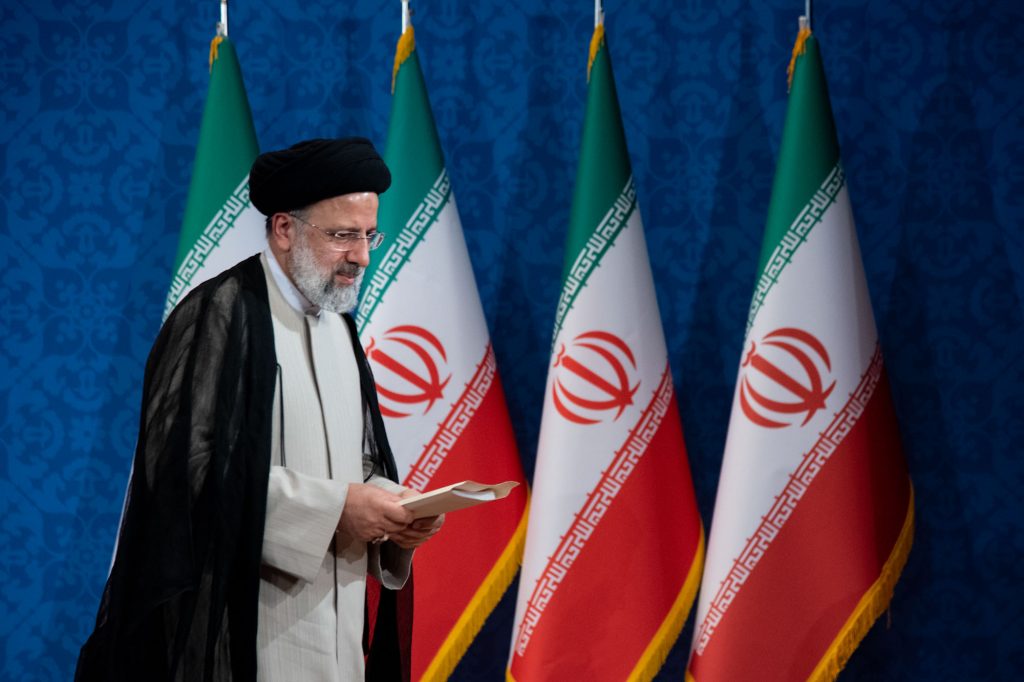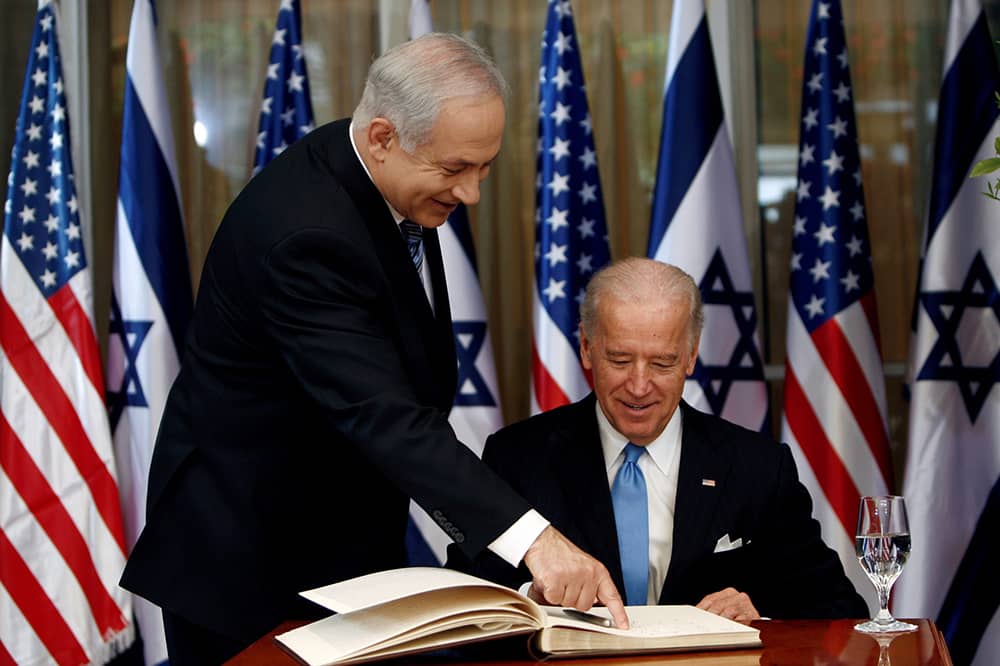Upon taking office in January 2021, President Joe Biden knew he needed to tackle a number of critical issues. There was, first and foremost, America’s response to COVID-19, and related to that, the American economy. He was anxious to begin to repair the United States’ relationship with its erstwhile Western European allies. The highly divided Democratic Party needed healing, as did, in a broader sense, the US as a whole.
What Biden did not want to do was to tackle the Israeli–Palestinian issue, which, as he knew from both half a century in the Senate and from his experience as Barack Obama’s vice president, was likely to be a no-win venture. The Middle East though, unpredictable as always, was unkind to the new president and drew him into the May 2021 conflict between Israel and Hamas, long before Biden had hoped to get involved in the region.
Up until that point, Biden’s attitude could be deduced from his choice to wait a full four weeks after taking office before calling Israel’s prime minister, Benjamin Netanyahu. He called many other heads of state first, apparently signaling both that he was not inclined to make the Middle East a priority and his abiding displeasure with Netanyahu’s perceived incursions into US politics. Many Democrats saw this as the real reason why Israel’s prime minister addressed a joint session of Congress in March 2015, over President Obama’s clear objections. Netanyahu’s dismissal of the Obama administration now came back to haunt him (it is worth noting that in June 2021, Biden waited only a few hours before calling newly appointed Prime Minister Naftali Bennett to congratulate him).
Biden was wise not to want to tackle the Middle East, for he knew well that he would be damned for whatever he did or did not do, and he did not bother hiding his reluctance to be drawn in.
Those looking to critique Biden for his handling of the Israeli–Palestinian issue of course found cause. Shibley Telhami wrote for the Brookings Institution that “few expected what was to come from the Biden administration: resistance to condemn even the clearest violation of international law and human rights by Israel—such as the plans to evict Palestinians from their homes in a Jerusalem neighborhood—even before the condemnable Hamas rockets began flying into Israel.” There was, of course, no reason at all for Biden to weigh in on an issue about which Israel’s Supreme Court had yet to rule and in a case that was a legal question about property rights, pertaining to houses lost by Jews to Jordan in 1948, and not part of an Israeli drive to evict Palestinians. But that did not stop Telhami from depicting Biden as being much less than a fair arbiter.
American Jews, particularly those on the right, viewed the incoming Biden administration with suspicion, worry, or even panic. Trump, many of them believed, was the most pro-Israel president the United States had ever elected. Trump’s ripping up of the 2015 nuclear deal with Iran, moving the American embassy to Jerusalem, and having facilitated the Abraham Accords (to say nothing of Nikki Haley’s robust defense of Israel at the United Nations) all contributed to this sentiment. That Trump’s perceived bromance with Benjamin Netanyahu was transforming Israel into what it never wanted to be in American politics—a wedge issue important to one party and problematic to the other—did not register with those who viewed the Biden administration with suspicion.
Thus, as the region heated up in the days prior to the outbreak of hostilities, this group, too, as could have been expected, found evidence to buttress its suspicions. A State Department statement on May 7 struck Israel and its supporters as one-sidedly hostile to Israel. The US, it said, was “extremely concerned about ongoing confrontations in Jerusalem, including on the Haram al-Sharif/Temple Mount and in Sheikh Jarrah, which have reportedly resulted in scores of injured people,” without mentioning that all that violence had been initiated by Palestinians, encouraged by the Palestinian Authority that was anxious to move the spotlight away from Mahmoud Abbas’s decision to cancel Palestinian elections (which he could have lost to Hamas). The State Department statement continued, “There is no excuse for violence, but such bloodshed is especially disturbing now, coming as it does on the last days of Ramadan,” suggesting, of course, that Israel was provoking Palestinians on days sacred to them, which was a gross oversimplification.
Jake Sullivan, the US national security advisor, echoed some of the State Department language, telling his Israeli counterpart Meir Ben-Shabbat that Washington had “serious concerns about the situation in Jerusalem, including violent confrontations at the Haram al-Sharif/Temple Mount during the last days of Ramadan.” Ben-Shabbat pushed back hard, rejecting Sullivan’s depiction of the situation, and, for a brief moment, it appeared that the confrontational relationship with Israel that some expected from the Biden administration had arrived.
That was not to be, however. Biden gave Israel 11 days, a considerable period of time, to do what it needed to do in Gaza. (Whether Israel succeeded in establishing the goal of restored deterrence is another matter altogether.) He was openly supportive of Israel, explicitly stating at a press conference that he did not believe that Israel had overreacted to Hamas’s attacks, a prevailing opinion in Western media notwithstanding.
Across the political spectrum in Israel, there was widespread agreement that Biden had comported himself admirably, supporting Israel when appropriate, while recognizing that he could not realistically allow the fighting to go on endlessly. When he did, apparently, pressure Netanyahu to bring the operation to an end, he did so privately and professionally, allowing everyone to save face. In this particular instance, Netanyahu’s kind words for Biden might not have been merely pro forma.
That was the case in May and June 2021, however, and health permitting, Biden still has a long tenure as president ahead of him. Now, with Gaza receding into the background of the Israeli and pro-Israel communities’ attention, the spotlight has moved onto the JCPOA, and Biden’s explicit hopes of reinstating the Iran nuclear agreement.

Ebrahim Raisi. Photo credit: Sobhan Farajvan/ Pacific Press/Sipa USA via Reuters Connect
Whether that will be possible—especially in light of the adversarial attitudes of the 60-year-old cleric and hardliner, Ebrahim Raisi, elected to replace Hassan Rouhani as Iran’s president— remains to be seen. Israel is using diplomatic channels, both publicly and behind the scenes, to make it clear to the Biden administration that it will not permit Iran to acquire nuclear weapons. This is, of course, the latest chapter in the decades-long story of the Begin doctrine, named after Menachem Begin authorized (and publicly explained) the raid that successfully destroyed the Iraqi nuclear reactor, OSIRAK, in 1981. Since then, it has been Israel’s expressed position that no enemy of the Jewish state will be allowed to acquire a nuclear military capability. Ehud Olmert upheld that doctrine when, with quiet American acquiescence, he ordered the destruction of a Syrian nuclear reactor under construction near Deir al-Zor, and it was that same doctrine that led Netanyahu to the controversial joint session of Congress.
Although other Israeli prime ministers—now Bennett, and others will follow—may well conduct similar campaigns more quietly, every significant Israeli political party shares a fundamental commitment to the Begin doctrine. Thus, if the Biden administration aggressively pursues a new JCPOA that Israel views as dangerous, there could well be turbulence in the relationship between Washington and Jerusalem. Ironically, Raisi’s election may make it somewhat easier for Israel to make the case in Washington; but aggressive Iranian behavior would only increase pressure within Israel to deal directly with the Iranian threat, which in the end will rebound into American–Israeli turbulence.
Perhaps most important to remember when watching the Biden administration’s relationship with Israel is that Biden is the last of his generation of Democrats. The era of Henry Jackson, Hubert Humphrey, Chuck Schumer, Nancy Pelosi, and Dianne Feinstein is coming to a close. What awaits Israel is a Democratic Party lurching to the left. Since Americans increasingly view the Middle East through the lenses of their own identity politics, this may mean much more sympathy for Palestinians than for Israelis.
Whatever the immediate future may hold for relations between Biden and the Israeli administrations that are in place during his tenure, the turbulence in the relationship between the two countries (as long as the Democrats remain in power) is almost certain to get more dangerous. Biden has, so far, acquitted himself quite admirably in his first Middle East challenge, and his long-standing commitment to Israel suggests that this position is likely to continue.
That said, Joe Biden is the president of the United States, not the prime minister of Israel, and the interests that he has at heart are those of America. If he believes that a JCPOA is in America’s interests, he will push for it, regardless of Israel’s objections. And if it is not the JCPOA that rocks the boat, it will eventually be something else.
Whatever that something may be, whatever discomfort some may have with this president’s handling of the Middle East and the Israeli–Palestinian conflict, what we experience over the next few years is likely to be a gentle breeze relative to the storm that almost certainly awaits. Israel would do well to repair its relationship with Washington on as many fronts as possible, genuinely restoring bipartisanship and rebuilding bridges to left-of-center organs of American Jewry. If Israel can do so, then the inevitable future frictions between the two countries can be resolved against the background of increased trust and a more robust sense of genuine partnership.

